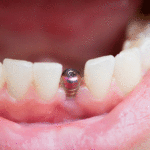Every year, thousands of people lose their lives to oral cancer. Often, the disease’s development is attributed to tobacco use or other lifestyle factors. However, there may be another contributing factor that increases the risk of oral cancer: ill-fitting, slipping dentures. This blog post examines the link between these problems.
What the Research Says
In 2017, researchers in India conducted a systematic study of scientific literature relevant to the connection between oral cancer and poorly fitting dentures. Here are a few highlights of what they found:
- A study in Sweden found that defective or malfunctioning dentures significantly increased the risk of oral squamous cell carcinoma.
- A separate study showed that in 44% of patients, there was a correlation between the site of their oral cancer and the location of chronic denture irritation.
Following their review of scientific literature, the study from India concluded, “Chronic mucosal irritation resulting from ill-fitting dentures may be considered a risk factor for subsequent development of oral cancer.”
Do the Dentures Actually Cause Cancer?
There is no known mechanism through which poorly fitting dentures may actually cause cancer. However, they may contribute to its development in a few ways:
- Inflammation. Inflammation is part of the body’s immune response. In the short term, it is a good thing. When it becomes chronic, however, it can lead to cell mutations and cancer. The oral tissue irritation caused by poorly fitting dentures can contribute to long-term inflammation.
- Trapping dangerous particles. Alcohol and tobacco are major risk factors for oral cancer. Ill-fitting dentures can trap particles from these substances underneath them, providing a prolonged opportunity to cause cell damage.
- Poor oral hygiene. Improperly fitting dentures are more likely to collect plaque and bacteria, which lead to an unhealthy oral environment.
What You Can Do
Here are some practical steps you can take to protect yourself from the risks presented by ill-fitting dentures:
- Visit your dentist regularly. Dentures should be relined periodically so they maintain their fit.
- Replace your denture when necessary. Most dentures should be replaced every 5 – 7 years. If you want a longer-lasting solution, it would be wise to consider getting dental implants instead.
- Examine your habits. If you use tobacco in any form, it is in your best interests to kick the habit as soon as possible. Moderate drinking should not pose a problem, but if you consume a lot of alcohol, you should seriously consider cutting back.
- Maintain excellent oral hygiene. You should thoroughly brush your dentures at least once a day. Regularly soaking them overnight in a cleaning solution is also advisable.
Poorly fitting dentures are more than an inconvenience — they could endanger your life! Getting them replaced or adjusted as soon as possible could improve your smile and reduce your risk of cancer.
Meet the Practice
Dr. Hanife Bayraktaroglu and our team are proud to provide both traditional dentures and implant-supported tooth replacement. If you are concerned about the way your dentures fit or function, we would be pleased to assist you. To schedule your free dental implant consultation or to learn more about our services, contact us at 737-250-0304.






